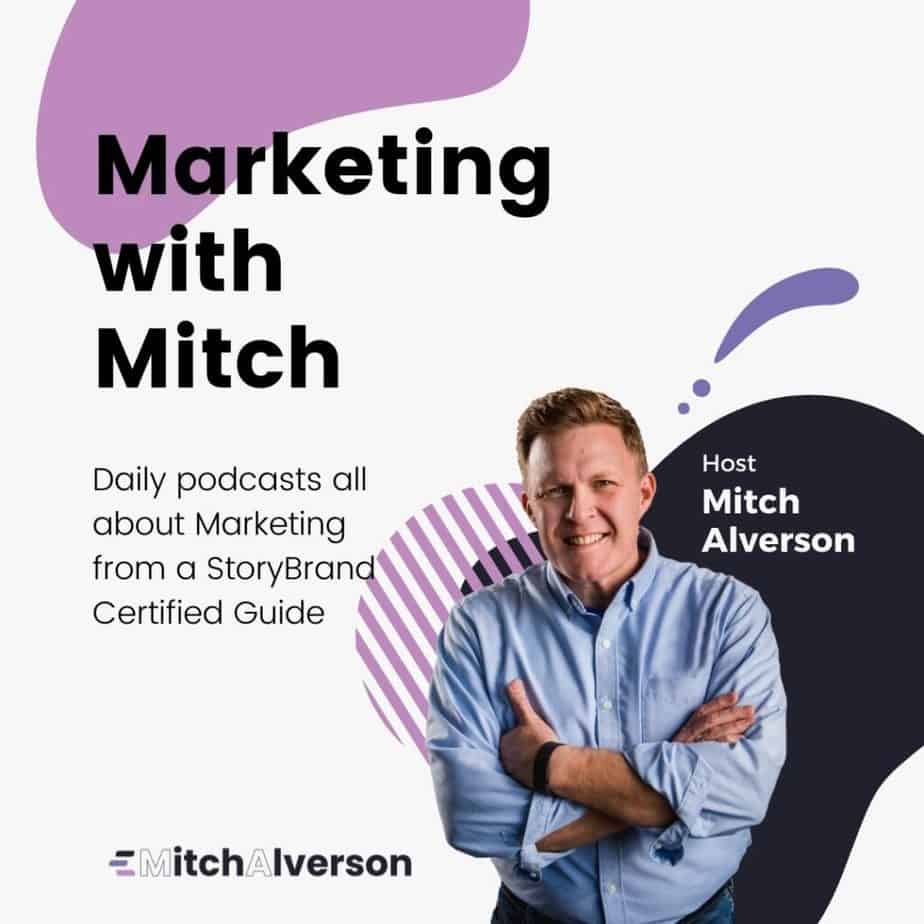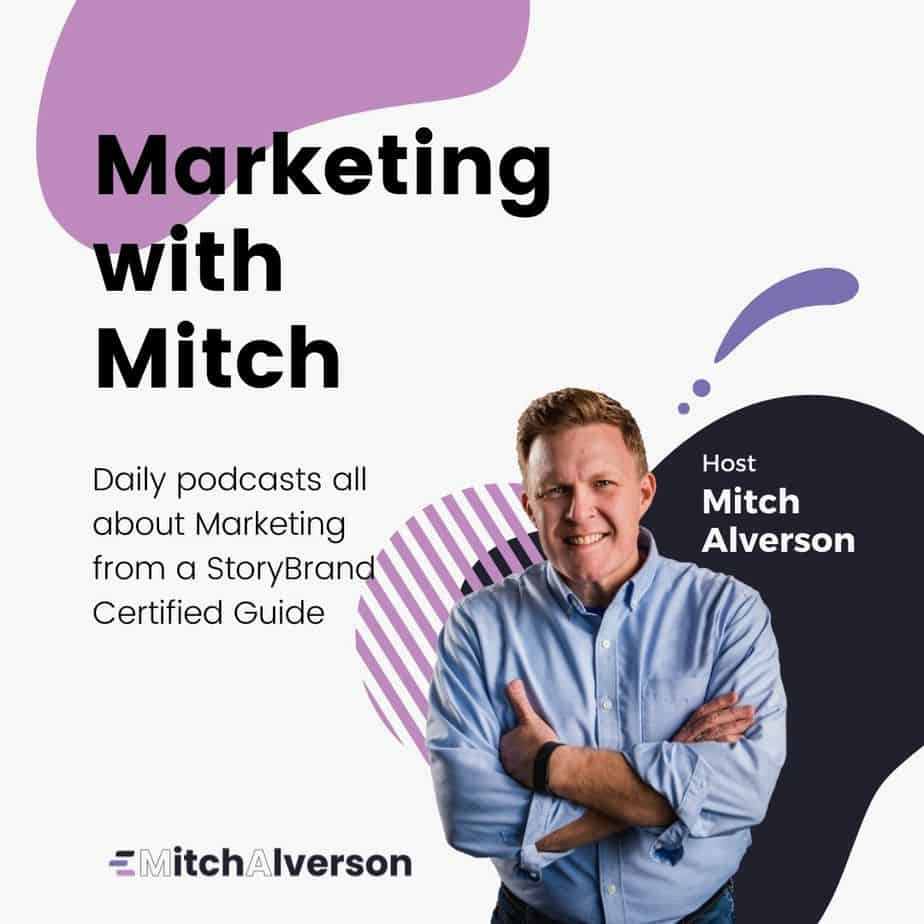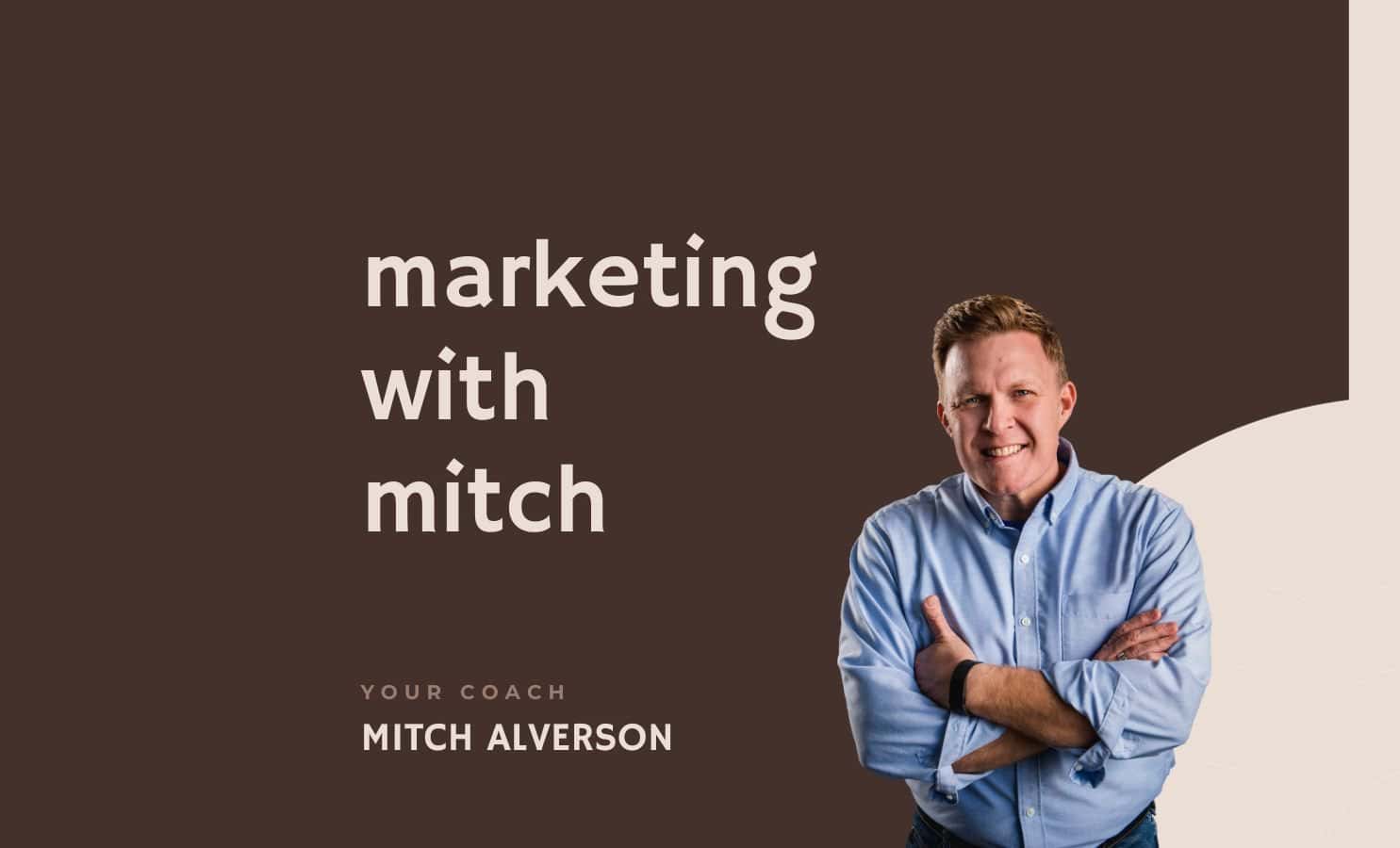
Show notes
GIVEAWAY information at the end of the podcast.
No one, absolutely no one wants to be around someone who talks about themselves all the time. It’s annoying!! So, why do so many companies and solopreneurs think they should do it in their marketing? Stop it! It’s not helping, it’s hurting. Your customers and potential customers wake every day as THE hero in their own story. So don’t go competing with them for who is going to be the hero. In this episode, I’ll show you how you can still talk about yourself in a way that makes your client the hero.
Check out Business Made Simple here.
Podcast Transcription from Marketing with Mitch: How to Talk About Yourself
Hey, guys hope you’re doing well there. Yeah, so let’s talk about this. How in the world are we supposed to talk about ourselves in our marketing? What makes sense? Here’s what doesn’t make sense? Okay, it’s when you talk all about yourself. So what happens right is your client, your potential clients, your family, your friends. We all wake up as the hero in our own story, and so what that means is you don’t want to compete to be the hero. Your client’s story right. So why not position yourself in a way that helps them be the hero in the Story?
StoryBrand Marketing Principle: Use Empathy and Authority
But do that in a way you know where you can actually help them, and so we do that two ways. We do it: first with sympathy, and the second way we do it is with authority. And so that’s how I would tell you to talk about yourself, first with sympathy, sympathy second with authority. So when I say empathy, what do I mean? Empathy for your client’s situation, for the problem that they are facing, and so we’ve talked about it in a previous episode. They have three levels of problems: the external problem. The actual thing that you know is keeping them from getting what they want, and then how that makes them feel is Internal.
And then there’s always a philosophical problem from the standpoint of you know, they deserve, it shouldn’t be this way or that sort of philosophical framing of the problem. So how do we do that? It’s so easy. Actually, you just say: you know, I understand what it’s like to, you know, suffer in this way, whatever the external problem was right. So let’s say it’s gosh. One thing, I’m struggling with right now that I’m trying to figure out.is my data storage., right?
I’m a Google customer and you know I’ve got like 100GB with Google, but you know, how do I get all that stuff organized and what am I going to do? Because I’m like you know, 75% full on my storage with Google. So in an empathetic way, you might say: we understand what it’s like to struggle with your data storage.
And that’s the reason why we built this product to solve this problem. So so once you’re past the empathetic statement and you can, you know you can go on a little bit more about it. But really all you need to do is tie your empathetic statement. One of those problems, the external, the internal or the philosophical. It should be tied directly to the problem. Now, once you’re past the empathy part, you can start talking about yourself in an authoritative way. You heard me say, that’s why we built this product. So now I can say: we built the product we have, you know, world-class engineers trying to solve this problem for you. Right for you, for there we want them to win the day. So we hired the best engineers in the world to solve this problem for our customers. We won an award on product hunt right. We did that for you. We built this product for you and guess what the world loved it. They gave us an award. So now we’re talking about ourselves in an authoritative way as it relates to our customer’s story. You see how that works, instead of talking all about ourselves and never mentioning what’s going on with our client and their story.
Now, what if you’re like a coach or a solopreneur? You know you can. You can work the same things in as a coach or a solopreneur. Just a freelancer you’ve got certifications.
You build if you work on Google ads and Facebook ads and you’ve got their certifications. You should say that if you have an MBA you should tell people about it, but only do it in a way, as it serves your client right and their story is not necessarily all about you. We need to know here’s from an authoritative standpoint. We need to know that you know what you’re doing and that you can help. You can help your client solve the problem. So that’s how you talk about yourself now. You can do that in a bunch of different ways.
You can do it on your About us page or about me page, you can do it on social media again, on social media, I would not go into it just telling folks about you. Go into it in a way where you can actually tell a story. Get to the point where you know you’re really good at what you!
But do it in a way where you’re speaking apathetically about your client’s problems and then authoritatively how you know you can help them solve the problem that they’re dealing with. There you go. That’s how you talk about yourself. Have a great day.
Hey guys, I’m giving away a free pass to Business Made Simple. It’s an annual subscription to business made simple. I’s you know, if you were to go by it, it’s 200 and 75 bucks, which is honestly an amazing deal. If I wasn’t giving this away, I would tell you it’s a no-brainer to spend the two and 75 on a subscription business made simple. But what you get there is on-demand courses, you know, to help you really with your business, with your career, grow your business. Also as being a part of the community there’s live monthly coaching. They have a sort of an application there where you can fill out your own professional development plan, which is a really smart thing to do. There are just some amazing courses there. The production is top-notch they’ve spent literally hundreds of thousands of dollars. You know, producing these courses there’s a course on strategy, productivity, your life plan, and productivity, which is great, is called a hero on a mission.
If you need to communicate, really anything internally or externally, there’s a course called communication, made simple and when you come out of it you’ll have every piece you need to communicate effectively inside your organization as well as outside, using press releases, email things like that.
There is clearly there’s a course on messaging, so the story on Messaging framework is in there. It is almost exactly the same material you would get if you purchased a dollar marketing Livestream course so that right there is just there’s just huge value. But I mean clearly, I’m giving it away for free. There’s a marketing-made simple course in there that will walk you through how to put together your own sales funnel. There’s a course on proposals, proposals made simple. I’ve used that philosophy and plan that they give you in proposals made simple to close a lot of business, so that right there again there’s just so much value in it. But anyway, if you want to enter for the giveaway, I’m going to do the giveaway on November 15. But go to b3advisors.org/book, fill out the form and you’ll be entered in the giveaway.


